Difficult Reading for Difficult Times
The Agony Column for October 30, 2002
Commentary by Rick Kleffel
So, you think you like to read, do you? Well that may be the case.
We'll see about that. Just like any avocation, hobby, or pass-time,
reading can be pursued in a variety of fashions. You can spend all
day reading the agony columns online, those tortured lonely-hearts
ads from singles looking to connect with another human being. You can
read a lot of light mysteries, nothing more substantial than an
Agatha Christie bon-bon. You can immerse yourself in Windows CE
course catalogs, spend your days keeping track of the myriad bug
fixes, security patches and driver updates so that your computer can
hum in the thirty seconds per day you have left to actually use it.
You can read the newspapers, magazines and all the printed matter
that the mailman bothers to bring you. You can spend all day reading
parts of a single Usenet Newsgroup.
But let's presume that you read books, plenty of 'em and are
looking for more books to read before you finish the volume that
you're presently reading. Let's take this a step further. Let's
presume that you have a reading queue. If you know what I'm talking
about you're probably starting to feel just a bit sheepish. It's OK,
it's really OK. Look, it's not like having a soap opera tape viewing
queue is it? Well, maybe just a bit, depending on what you're
reading.
With the summer gone, the time for light and fun reading has come
to a full stop. As the days grow darker, as the war gets nearer, as
the economy plunges deeper into the Big Swirly, readers will need
something a bit more challenging than the simple fluff of a light
mystery featuring a spunky female detective, or the entertaining
piffle of monsters on the loose in a small town in America, or the
cheap thrills of rockets, aliens and space battles. Readers need
grist for the mill, torment as detailed as that which they are now
suffering. For your safety, I'm going to skip all the books they
forced you read in college, and get right to the good stuff. Some of
it is actually even genre fiction. Some of it isn't, but that's OK
because it's so difficult to read it might as well be science
fiction. Everybody's done some difficult reading. Let's make sure
it's also enjoyable reading.
Why read a book that's hard to read? Well, the answer is
surprisingly easy to give. Simply put, your reward in reading a book
may be proportional to the effort you exert in reading it. That's the
theory at least, although it doesn't always work out that way.
Certainly there are simple reads that are as powerful as reading can
be -- last column's Flannery O'Connor and William Gay stories leap to
mind, as do the stories of Kafka and Borges. Can't get any more
literarily rewarding than that! And there's a lot to be said for
Agatha Christie as well. But there's a level of satisfaction that
some readers can only get from books that are well -- difficult
reading. You may be one of those readers; if not, let me show you
how!
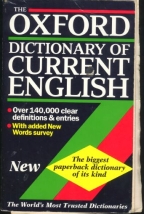
|
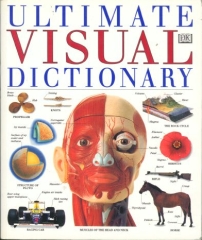
|
|
Don't start your difficult reading exercise without
the proper tools at hand. No need to injure yourself on your
first outing.
|
This Visual Dictionary from DK books is a feat of
engineering. It's helpful for both readers and writers who
might need a bit of help, uh -- visualizing something.
|
First off, there are a couple of tools that are essential for
those about to launch into a book that fits under the difficult
reading label. You need a dictionary. Trust me, looking up the words
that you don't know is part of the fun here. And there had better be
words you don't know even if you've got a set of vocabulary
self-improvement tapes in the glove compartment of your car. You'll
want a pad of paper, so you can write them down as well. An
encyclopedia is probably a good idea, or a handy computer wired up
and ready to, as they say, "surf the web". Got those? OK, now find a
nice, well, lit and comfy chair, and say, five blank hours when you
can shoo away the kids, the spouse, the job and any other pesky parts
of your life without any resident guilt. That's harder. Once you have
that, you're ready to read.
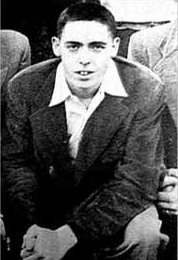
|
|
Famously reclusive Thomas Pynchon is perhaps the
reigning King of Difficult Reading.
|
For many people, difficult reading begins and then comes to a
grinding halt with Thomas Pynchon, particularly 'Gravity's Rainbow'.
Now, I like Pynchon as well as anyone, but I don't recommend this
particular brick for maximizing your initial Pynchon Difficult
Reading Assignment. That honor probably belongs to 'The Crying of Lot
49', a short and lovely but yes, rather difficult read that will
infect your consciousness with the reading equivalent of
hallucinatory schizophrenia. Because it's short, you're more likely
to make it to the goal, that is, actually finishing the difficult
reading assignment you've handed yourself. Finishing is critical for
true difficult reading enjoyment. If you don't do it, you'll feel
cheated by your own lack of stick-to-it-ive-ness. Stay with it man,
steady on your course! You can make it through this 160 page loaded
sugar cube of a novel. See? You're a better person already. I knew
this would happen!
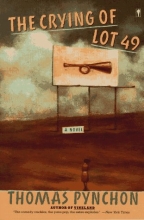
|
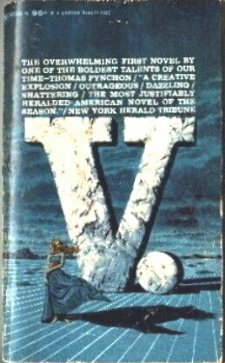
|
|
'The Crying of Lot 49' will function as water wings
for those first taking a dip in the dangerous waters of
Difficult Reading.
|
This is what becomes of your copy of Thomas Pynchon's
'V' when you leave it in a box out in the garage as opposed
to stored neatly on yet another bookshelf. Warn your wife
and children not to toy with dangerous forces like
this!
|
Now that you've done your mere 160 pages of penance, you're ready
to graduate into some more manly reading, no matter what your given
sex may be. Let's stick with Pynchon and head straight over to 'V',
which while quite a bit longer is actually rather more readable.
There are still the probably copyrighted bits of Pynchon madness, but
having cried all the way through lot 49, you're out of tears and
beyond fears. 'V' will seem to some to be practically normal and
verging on easy reading. Don't be fooled. Beneath that followable
plot and those remarkably consistent characters lies a truly
mind-boggling symbolic framework.
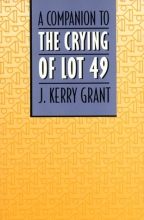
|
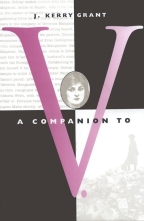
|
|
Let J. Kerry Grant help you achieve insight and
understanding of today's most Difficult Reading!
|
It's your call whether you hide these companions or
place them proudly next to the works they Cliff-notify.
|
While, or actually before you start your Pynchon reading
experience, you might want to take a little look at the works J.
Kerry Grant, who has undertaken to write 'Companions' to most of
Pynchon's works. These companions have to be used with a fair amount
of caution, as they can both spoil and confuse the reader rather than
simply enlightening. Start with the dictionary, keep it close to
hand. But these companions can also be invaluable puzzle solvers and
lead to some very pleasing 'light-bulb' moments. Individual readers
should surely pick one up and given them a try, but use them
sparingly. If you like them, and can find a way to weave them in to
your novel reading experience, great. In practice, I've found this a
bit difficult.
|
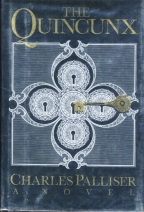
|
|
This book cover didn't scan well at all.
It's really very nice.
|
Having made the grade with Pynchon, and hopefully, having
experienced at least one wonderful light bulb, you can now survey the
vast world of Difficult Reading awaiting you. Difficult reading does
not always come pre-loaded with enough symbols to keep Keith Moon
happy in heaven. Sometimes, you can have a book that's just real damn
long that qualifies for the prize. One of my special moments and
memories is the time I spent inside Charles Palliser's 'The
Quincunx'. This is the novel for all those who actually really,
really wanted to enjoy Dickens when it was crammed down your throat
by Evil English teachers in either High school or college. Compared
to some of the crap I've read, it seems positively sleek at a mere
788 pages, including a many page long index of characters. You'll
need that. Simply being long does not in itself qualify a book as
difficult. Otherwise, someone would be calling 'The Stand' difficult
reading, and while that fine novel is many things, difficult reading
is surely not one of them. But, back to Palliser's brick. What 'The
Quincunx' offers in the way of complexity is a plot that makes
Enron's energy scam look like an episode of 'Magnum, PI'. It offers
characters that come to seem like neighbors and scenery so well
rendered you can warm yourself in the sunlit courtyards. It also
offers a lovely lightbulb moment that lasts longer than your average
mystery novel.
|
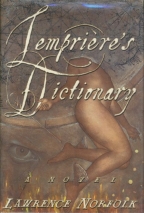
|
|
Lawrence Norfolk's 'Lempriere's Dictionary'
will require the use of those illustrated above.
|
Those looking for something slightly closer to home, a novel both
difficult and yet offering some scraps of genre pleasure need look no
further than Lawrence Norfolk's 'Lempriere's
Dictionary'. No, it doesn't come with a dictionary, but it might
require one. What Norfolk's first novel offers is heavy-lifting
symbolism, a plot so dense it's practically a quantum event and some
glimmers of supernatural beings made more potent and powerful by
Norfolk's obscurantism. Like most of the books I'm discussing in this
column, it's definitely not for everybody. But those who actually
make it this far into a column on difficult reading might find it the
best 422 page legal opiate that money can buy.
Having now dabbled in genre fiction let's shed our literary
pretense and head back to safety. Well, at least as much safety as
genre fiction Difficult Reading can offer. Genre fiction is certainly
not without it's difficult writers. In fact, genre fiction offers
some unique opportunities for the difficult writer. Alas, I haven't
even managed to get round to reading one of the primary forces in
difficult genre fiction, Geoff Ryman. But I known one when I see one,
and his works, from 'The Child Garden' to '253' have the unmistakable
look and feel of prime Difficult Reading. He's certainly in the
queue.
|
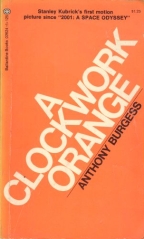
|
|
This edition of this book cost be $1.25. It
was bought concurrent with the Stanley Kubrick adaptation.
|
One of the prime Difficult Reading experiences for the science
fiction reader is of course Anthony Burgess' remarkable 'A Clockwork
Orange'. While the plot is fairly straightforward, the presentation
is famously tweaked, as Burgess came up with an argot so thick that
the dictionary at the back of the book is pretty much required to
even get through the novel. But make no mistake, there is some
argument on that point. Still, it's a fascinating achievement and
pretty much a must-read even if you have seen the unusually excellent
movie adaptation. Burgess' linguistic flight of invention is more
than a mere game or a spray paint job over the plot. It's an integral
part of the literary experience, a mind-bubbling reminder that we
experience both books and our world through language. This is a
device that other writers have taken up in their own fashion.
|

|
|
John Clute's 'Appleseed' takes Difficult
Reading straight to the heart of the Science Fiction genre.
|
An excellent recent example of this is John Clute's 'Appleseed',
mentioned here in other columns. Let's just say that in this case,
you do want the encyclopedia at hand, and that the encyclopedia you
want is the one written by Clute himself. Like Burgess, Clute
immerses the reader in a sea of unfamiliar language; unlike Burgess,
there's no translation provided. But that works out fine, as Clute
requires that utterly alien feeling to convey his portrait of a
future as difference from our present as our present is from the
world of 300 years ago. Clute's novel is one of the purest science
fictional reading experiences you're going to get. Some readers will
wilt, some will be thrilled. There's not going to be a lot of middle
ground when it comes to a novel like this.
|
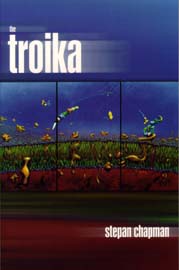
|
|
Ministry of Whimsy took a flyer publishing
this sublimely weird and Difficult novel.
|
Stepan Chapman's 'The
Troika' is a similarly disorienting piece of science-fiction
surrealism. Like a Dali painting transmogrified into prose by Philip
K. Dick, 'The Troika' wears its mystery pinned to its pocket
protector. There are poignant character pieces built from the absurd,
and powerful horrific hallucinations to propel the action forward.
Unless you put your rational brain into some sort of 'acquire only'
mode, you're liable to be scratching your head trying to figure out
what the hell is going on. To Chapman's credit, he does eventually at
least attempt to solve the mystery for the reader, but not in such a
fashion as to destroy the challenge. For science fiction readers who
like tough sledding and more than a bit of horror, 'The Troika' will
fulfill your monthly requirement of Difficult Reading with visions to
spare. Here's an instance where the publisher makes a difference:
Ministry of Whimsy specializes in this kind of fiction. If it weren't
for their willingness to take a risk, readers would not be able to
take a rish either, something to consider when purchasing
volumes.
|
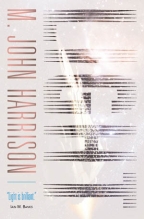
|
|
Oh, this book isn't as difficult as all
that. It's not another Star* produtisement either.
|
Reads will have noticed that this column on Difficult Reading is
rather tilted towards the Science Fiction side of the genre range. An
author who manages to bridge that gap and provide some fairly
difficult reading in the process is M. John Harrison. Starting out
with his latest, 'Light',
you can find a wealth of tough-to-suss in both the present day and
far future segments of the novel. Harrison's novel is something like
a dosed smart drink from the rave bar. Just when you think you're
feeling really brilliant, another hallucination pops along to put you
in your place. It's a pleasurable place to be if you're up for a bit
of difficult reading. Harrison hallucinates with the best of them,
and back-loads his visual and narrative invention with a densely
layered symbolic semaphore.
|
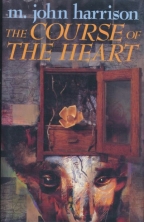
|
|
This evocative novel features a cover by
Dave McKean.
|
Harrison's no stranger to Difficult Readers, and he's managed to
write some rather brilliant novels that could be classified as pure
horror. [I'll let the marketing executives at the chain
bookstores have exclusive use of the namby-pamby term 'Dark Fantasy',
thankyouverymuch.] His novel 'The Course of the Heart' is a
head-ripping blur about magic, love, and an intense yearning for life
that destroys life, death and lots in-between. Like 'The Quincunx',
this novel will create sunny days and chilly evenings that the reader
will be able to visit in their mind for years afterwards. In all
other aspects it's utterly different. Yes, as a reader, you'll have
to work a bit to get there, but it's well worth the effort. Reading
novels like 'The Course of the Heart' reminds the reader that the
effort of reading is a journey that is itself a goal, not the end of
the book and the point of the plot.
|
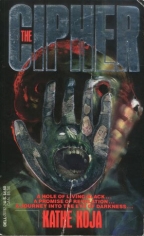
|
|
This book knocked off a lot of socks in its
time. Now, it's gathering dust instead of the accolades it
deserves. Next time someone tells you that horror is dead,
remind them of this novel.
|
But Harrison isn't the only writer out there working the Difficult
Reading space in the horror genre. It was only 11 years ago that Jean
Cavelos debuted her groundbreaking Abyss line with Kathe Koja's 'The
Cipher'. Koja followed it up with 'Bad
Brains', 'Strange Angels' and a host of novels and short stories
that really reach to the essence of difficult reading on a number of
levels. Yes, some of the difficulty comes in simply reading about the
repulsive things she chooses to write about, but she's no simple Lucy
Taylor (good in her own right, but not difficult). Koja manages to
peer into the dead space between the thoughts of her characters and
unveils a universe of hurt, woe and incomprehension. Her prose style
is quite peculiar, disorienting and surreal. It's like getting a
report form an opium dream. There's a dreamer there somewhere, but
the reader is even less certain about the identity of the dreamer
than the dreamer him or her self. Yet her reportage of the events
that transpire in her character's brains is mind-stretching and
immediate. Koja is clearly not a writer who will please entertain or
even be readable to all readers. Yet her sense of her writing is so
strong and individual, it's undeniably the result of great -- though
heavily tweaked -- talent.
|
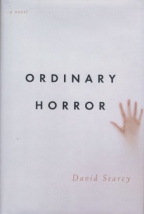
|
|
This novel confounded a lot of readers with
its intense, eerie and low-key creation of the muddled mind
of a suburban widower.
|
David Searcy was covered in this column recently as part of the
New Southern Gothic tradition, but don't discount him when it comes
to Difficult Reading. He can easily write a three-page paragraph or a
half-page sentence. He starts with a simple thought and has the
reader feel as they've been teleported about 2,000 feet above the
prairies or suburbs where his stories are set. And he can do all this
without any easy resort to surrealism, science fiction, strangeness
or even a particularly wonky use of the English language. In many
ways, he exemplifies the essence difficult reading as much as does
Thomas Pynchon. But 'Ordinary
Horror' and 'Last
Things' have an utterly different feel from that of Pychon.
So with this handy guide, just about any reader, from the most
foo-foo artistic meaning-of-life literati types to the
head-in-the-Magellanic-clouds science fiction fans can easily find
the perfect level of Difficult Reading, something to keep the brain
ticking and the mental CPU warm through these long winter nights.
Difficult Reading isn't really any harder than --what do I call it?
-- regular reading? It's no more difficult to tackle some Pynchon,
Clute, Harrison, Koja or Searcy after reading your Stephen King
burger than it is running a marathon after you've just started
jogging round the block. And it's every bit as rewarding. Really.
Not that I run marathons, mind you.
Thanks,
Rick Kleffel















